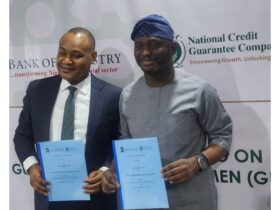Explosive ₦850m Abuja Market Clash Heads to Court on Nov. 13 Over Alleged Injunction Breach

The Federal Capital Territory High Court in Maitama, Abuja, is scheduled to hear a significant ₦850 million lawsuit concerning the Apo Resettlement Market on November 13, 2025. The dispute arises from claims that the plaintiffs proceeded with construction on the property despite a standing court injunction prohibiting such activities.
The defendants have responded by filing a motion for punitive damages, alleging that the plaintiffs blatantly ignored a court order issued on April 15, 2025, which barred any development on the site pending the resolution of the case.
Represented by their lawyer, Realwan Okpanachi, the defendants submitted motion number M/10869/25, requesting the court to impose ₦50 million in punitive costs on the plaintiffs for their non-compliance with the injunction.
Originally set for a Tuesday hearing, the case was postponed because the presiding judge, Justice Yusuf Halilu, was attending a workshop at the National Judicial Institute. The court has since informed all parties of the new hearing date.
The legal battle centers on Plot 1729, Cadastral Zone E27, located in Abuja’s Apo District, where a market development project is underway.
The lawsuit names AMAC Investment and Development Company and two others as plaintiffs/respondents, while Dr. Shuaibu Omeiza Musari and Techs and Concretes Nigeria Limited are the defendants/applicants.
On April 15, 2025, Justice Halilu issued an interlocutory injunction preventing any party-especially the plaintiffs-from continuing construction on the disputed land until the main case (CV/467/2024) is resolved. This injunction was granted following an application by Techs and Concretes Nigeria Ltd to maintain the status quo.
Despite this judicial directive, Okpanachi, representing the defendants, accused the plaintiffs of violating the injunction by resuming building activities on the site.
In their current motion, the defendants are urging the court to order the plaintiffs to pay ₦850 million in punitive damages for defying the court order. They also seek a directive to demolish any structures erected in breach of the injunction.
Alternatively, the defendants request that the court instruct the Inspector-General of Police, the FCT Commissioner of Police, and the Director-General of the Department of State Services to seal off the property to protect the subject matter and ensure compliance with the court’s orders.
Supporting their motion with an affidavit, Techs and Concretes stated that although the April 15 injunction was properly served and visibly posted at the site, the plaintiffs removed the notice and erased all markings before resuming construction, thereby violating the court’s directive.
The company warned that failure to impose penalties could set a dangerous precedent, encouraging disregard for judicial rulings and undermining the authority of the courts.
Previously, Techs and Concretes informed the court of a joint venture agreement with Manillah Integrated Partners Ltd, where Techs and Concretes acted as financier, co-developer, and exclusive marketer, while Manillah was the developer.
Techs and Concretes accused Manillah and its affiliates of breaching the agreement by unilaterally continuing the market development and initiating legal action to avoid accountability.
In his April 15 ruling, Justice Halilu upheld the joint venture agreement’s validity, recognized Techs and Concretes’ legal interest in the project, and granted the interlocutory injunction.
Related: Civil unrest can disrupt supply chains, limit employee mobility – Bademosi
Following the ruling, Dr. Musari, accompanied by security personnel, visited the site to enforce the court order by posting copies of the injunction and instructing workers to cease construction immediately.
Dr. Musari stressed that his actions were motivated by a commitment to uphold the rule of law and ensure all parties adhere to judicial mandates.








Leave a Reply